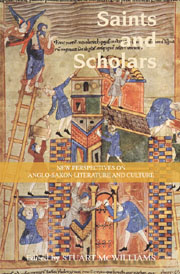 Saints and Scholars
Saints and Scholars Book contents
- Frontmatter
- Contents
- List of Contributors
- Abbreviations
- Introduction
- I Hagiography and the Homiletic Tradition
- 1 A Note on the Sensational Old English Life of St Margaret
- 2 A Place to Weep: Joseph in the Beer-Room and Anglo-Saxon Gestures of Emotion
- 3 Aldhelm's Choice of Saints for his Prose De Virginitate
- 4 Shepherding the Shepherds in the Ways of Pastoral Care: Ælfric and Cambridge University Library, MS Gg.3.28
- 5 “Consider Lazarus”: A Context for Vercelli Homily VII
- 6 More than a Female Joseph: The Sources of the Late-Fifth-Century Passio Sanctae Eugeniae
- 7 Ælfric, Leofric and In Natale Plurimorum Apostolorum
- II Aspects of Community and Consumption
- III Reflections on Old English Scholarship
- Poems
- Hugh Magennis: A Bibliography, 1981–2011
- Index
- Tabula Gratulatoria
5 - “Consider Lazarus”: A Context for Vercelli Homily VII
from I - Hagiography and the Homiletic Tradition
Published online by Cambridge University Press: 05 February 2013
- Frontmatter
- Contents
- List of Contributors
- Abbreviations
- Introduction
- I Hagiography and the Homiletic Tradition
- 1 A Note on the Sensational Old English Life of St Margaret
- 2 A Place to Weep: Joseph in the Beer-Room and Anglo-Saxon Gestures of Emotion
- 3 Aldhelm's Choice of Saints for his Prose De Virginitate
- 4 Shepherding the Shepherds in the Ways of Pastoral Care: Ælfric and Cambridge University Library, MS Gg.3.28
- 5 “Consider Lazarus”: A Context for Vercelli Homily VII
- 6 More than a Female Joseph: The Sources of the Late-Fifth-Century Passio Sanctae Eugeniae
- 7 Ælfric, Leofric and In Natale Plurimorum Apostolorum
- II Aspects of Community and Consumption
- III Reflections on Old English Scholarship
- Poems
- Hugh Magennis: A Bibliography, 1981–2011
- Index
- Tabula Gratulatoria
Summary
The closing section of Vercelli Homily VII (lines 84–118) is directed towards the need for moderation in eating and drinking. Here, in the words of Hugh Magennis, the homily asserts the ‘necessity and goodness of food, as opposed to overindulgence’, an observation tucked away in a footnote in his Anglo-Saxon Appetites. The context in which this footnote arises is, interestingly, a discussion of feasting and drinking as ‘among the worldly things that distract people from the great realities of death and judgement’, and Magennis points out that for ‘Gregory and other homilists, the exemplum of Dives (Luke xvi. 19–31) was especially instructive, both as a warning of the dangers of feasting in particular and as an illustration of the inane gaudium of worldliness in general’. In this paper I should like to argue for the particular relevance of the Dives parable to understanding Vercelli Homily VII.
Vercelli Homily VII is an Old English text found only in the Vercelli Book, where it is the second in a group of five homilies, VI–X, which may have come from a single source. The first of the five has a rubric, making its identity as a Christmas homily clear, and as Celia Sisam points out, it ‘needed no numeral to denote that it was the first in the series’. It is the only one of these five homilies to have a heading.
- Type
- Chapter
- Information
- Saints and ScholarsNew Perspectives on Anglo-Saxon Literature and Culture in Honour of Hugh Magennis, pp. 75 - 86Publisher: Boydell & BrewerPrint publication year: 2012


